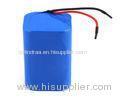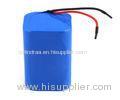Li-ion 18650 Battery Pack 1S2P 6800mAh for Track Device with Samsung 18650 Cells
The battery is a rechargeable battery best suited to mobile devices that require small-size, light weight and high performance. Its characteristics of high energy and high voltage (3.6V) powerfully fulfill these three key requirements. Its standard battery-pack, coupled with a charger, facilitates simple equipment design.
Features:
- Adopt Brand New and Grade A Samsung ICR18650-26FM 2600mAh cell
- Longer power time
- Remain 80% Capacity after 500 charge-discharge cycles
- Japan SEIKO protection IC
- Less self-discharge (approx. 1/10) compared with a Ni-MH or Ni-Cd batteries as well as no memory effect.
Application:
- Cordless electronic products
- Portable Medical Equipment
- Lighting
- Safty and Security Device
- Test Instruments
- Portable Electronic Products
Detailed Specification:
- Normal Voltage: 14.8V
- Normal Capacity: 2600mAh
- Charge Method: CC/CV (Constant current-constant voltage)
- Limited charging Voltage: 14.8V
- Charging Current:(Std.) 520mA(0.2C) Charging Time(Std.):6hours
- Rapid charge (Max.) 1040mA(0.4C) Rapid charge time : 3hours
- End-of-charge Current. 52mA (0.02C)
- Discharge cut-off voltage. 11V
- Discharging current: Max. 1040mA(0.4C)
- Standard charge current 520mA(0.2C)
- Internal Resistance: <180mΩ
- Weight: 180g
- Dimention: 18.6 x 36.8 x 36.8mm
- Temperature:Charge 0 ~ 45
- Ambient Temperature:Discharge -20~ 60
- Temperature range for storage:
Less than 1month -20~ 60
Less than 3months -20 ~ 45
Less than 1year -20 ~ 20
65± 20%RH
Lithium Battery FAQ:
What is the difference between Lithium batteries and Lithium Ion batteries?
There are several important differences. The practical difference between Lithium batteries and Lithium-ion (Li-ion) batteries is that most Lithium batteries are not rechargeable but Li-ion batteries are rechargeable. From a chemical standpoint Lithium batteries use lithium in its pure metallic form. Li-ion batteries use lithium compounds which are much more stable than the elemental lithium used in lithium batteries. A lithium battery should never be recharged while lithium-ion batteries are designed to be recharged hundreds of times.
What are the advantages of Lithium Ion batteries compared to other rechargeable batteries?
Lithium-ion batteries have several advantages:
They have a higher energy density than most other types of rechargeables. This means that for their size or weight they can store more energy than other rechargeable batteries. They also operate at higher voltages than other rechargeables, typically about 3.7 volts for lithium-ion vs. 1.2 volts for NiMH or NiCd. This means a single cell can often be used rather than multiple NiMH or NiCd cells.
Lithium-ion batteries also have a lower self discharge rate than other types of rechargeable batteries. This means that once they are charged they will retain their charge for a longer time than other types of rechargeable batteries. NiMH and NiCd batteries can lose anywhere from 1-5% of their charge per day, (depending on the storage temperature) even if they are not installed in a device. Lithium-ion batteries will retain most of their charge even after months of storage.
So in summary; lithium-ion batteries can be smaller or lighter, have a higher voltage and hold a charge much longer than other types of batteries.
What are the disadvantages of Lithium Ion batteries compared with other rechargeable batteries?
Lithium-ion batteries are more expensive than similar capacity NiMH or NiCd batteries. This is because they are much more complex to manufacture. Li-ion batteries actually include special circuitry to protect the battery from damage due to overcharging or undercharging. They are also more expensive because they are manufactured in much smaller numbers than NiMH or NiCd batteries. Li-ion batteries are becoming less expensive and over time we should see their price decrease significantly.
Lithium ion batteries are not available in standard cells sizes (AA, C and D) like NiMH and NiCd batteries.
Lithium-ion batteries also require sophisticated chargers that can carefully monitor the charge process. And because of their different shapes and sizes each type of Li-ion battery requires a charger designed to accommodate its particular size. This means lithium ion battery chargers are more expensive and more difficult to find than NiMH and NiCd battery chargers.
Are Lithium Ion batteries available in standard sizes like AA , C or D cell size?
No, Lithium-ion batteries are not available in standard sizes. We believe this is because it would be too easy for users to inadvertently put them in a charger not designed for Lithium-ion batteries creating a potentially dangerous situation. (If an alkaline battery is put into the wrong charger it might leak or even burst, but a lithium-ion battery put into a NiCd or NiMH charger not designed for lithium-ion, might ignite. Also, because Li-ion batteries operate at much higher voltage (typically 3.7V per cell) than the 1.2 to 1.5V of most cell batteries, designing a 1.5V lithium-ion cell would be expensive.
What is the difference between "name brand" (Canon, Nikon, Fuji, etc.) Lithium Ion batteries and the other types?
Like prescription drugs there is often very little difference between name brand lithium-ion batteries and generic lithium-ion batteries. Camera makers often make very little from the sale of the camera itself, but have high profit margins for the accessories, like batteries and flashes. Not all third party batteries are the same quality as the original battery, but many (including those which we sell) are virtually identical.
What is the best way to store Lithium Ion batteries?
Lithium-ion batteries can hold a charge for many months. It is best to store a lithium-ion battery with a partial or full charge. Occasionally, a lithium-ion battery with a very low charge is stored for a long period of time (many months) and its voltage slowly drops to below the level at which its built in safety mechanism allows it to be charged again. If the battery is going to be stored for several months it's a good idea to take it out and recharge it after a few months. Better yet would be to actually use the battery every few months and then leave it partially or fully charged.
Safety Precautions:
Danger
(1) Misusing the battery may cause the battery to get hot, explode, or ignite and cause serious injury. Be sure to follow the safety rules listed below:
• Do not place the battery in fire or heat the battery.
• Do not install the battery backwards so that the polarity is reversed.
• Do not connect the positive terminal and the negative terminal of the battery to each other with any
metal object (such as wire).
• Do not carry or store the batteries together with necklaces, hairpins, or other metal objects.
• Do not penetrate the battery with nails, strike the battery with a hammer, step on the battery, or otherwise subject it to strong impacts or shocks.
• Do not solder directly onto the battery.
• Do not expose the battery to water or salt water, or allow the battery to get wet.
(2) Do not disassemble or modify the battery. The battery contains safety and protection devices which, if
damaged, may cause the battery to generate heat, explode or ignite.
(3) Do not insert the battery into equipment designed to be hermetically sealed. In some cases hydrogen
or oxygen may be discharged from the cell which may result in rupture, fire or explosion.
(4)Do not place the battery on or near fires, stoves, or other high-temperature locations.
Do not place the battery in direct sunshine, or use or store the battery inside cars in hot weather. Doing so may cause the battery to generate heat, explode, or ignite. Using the batte








